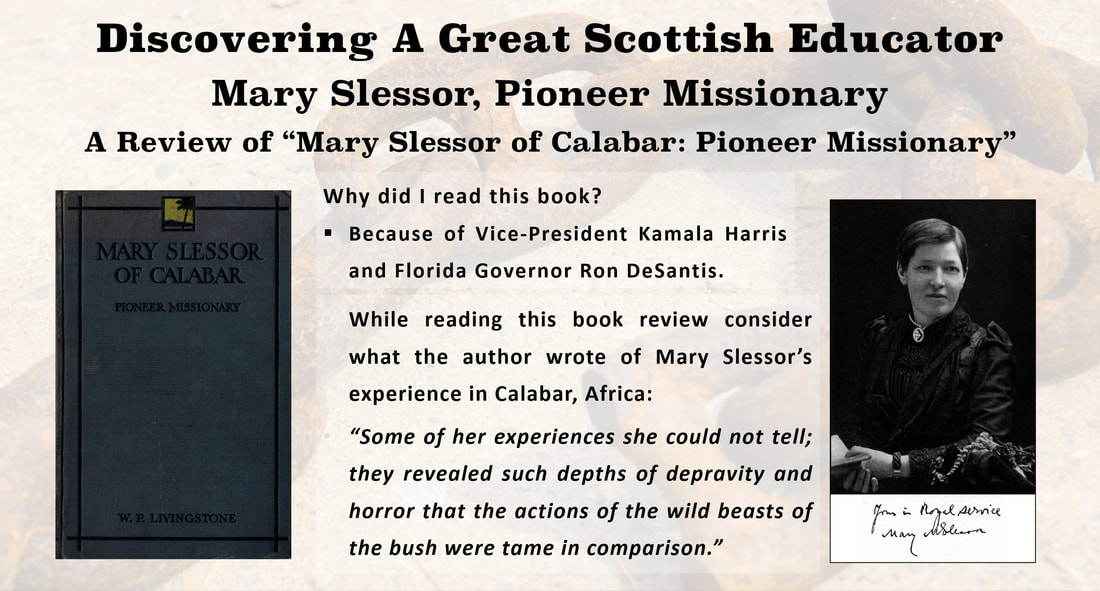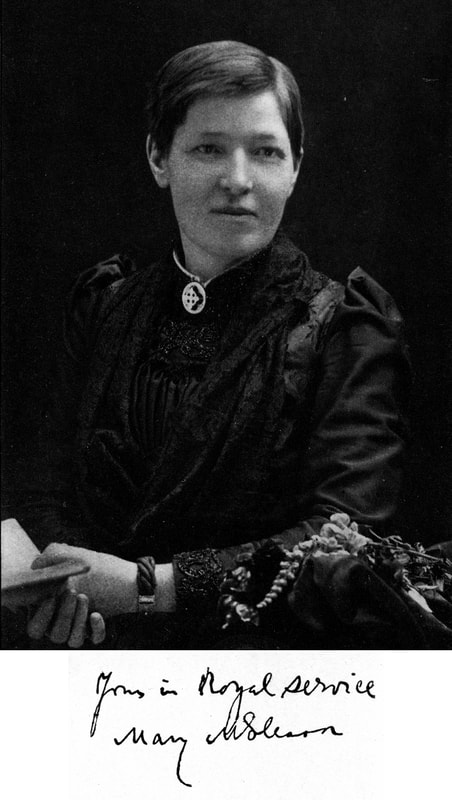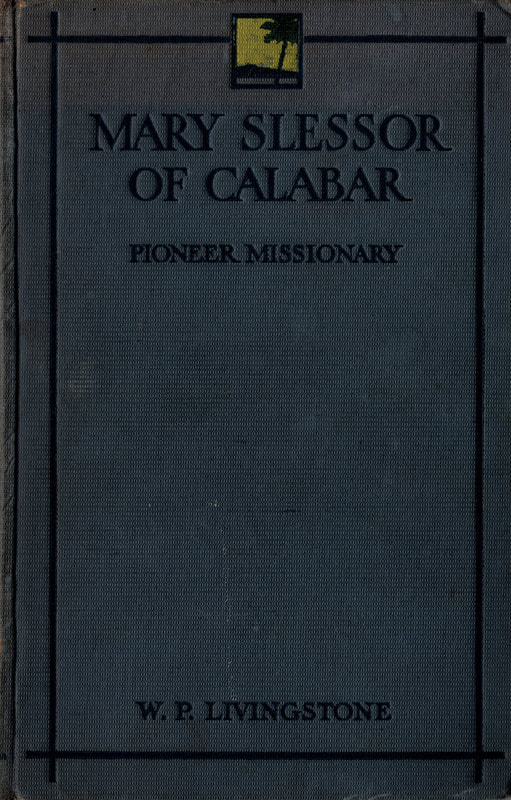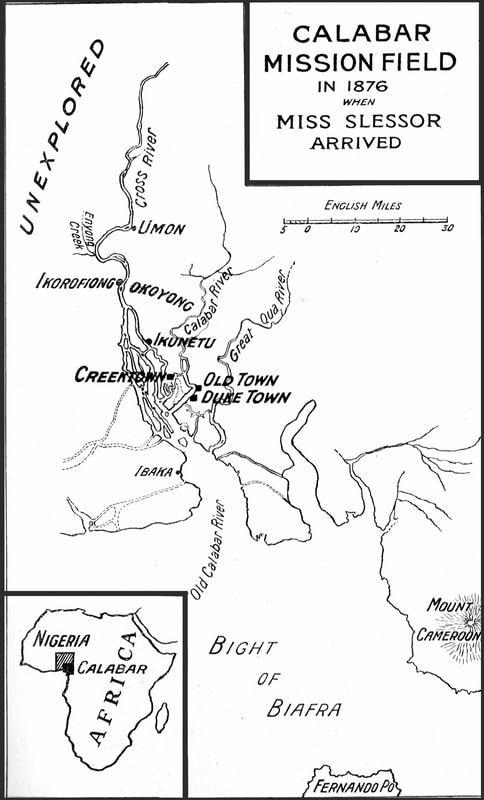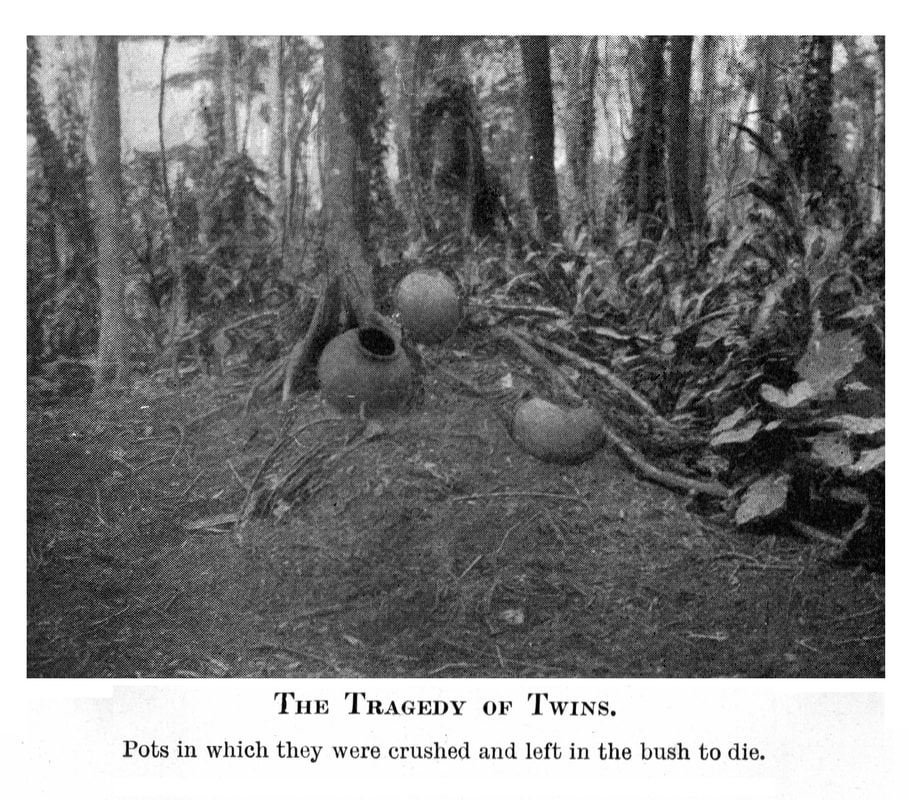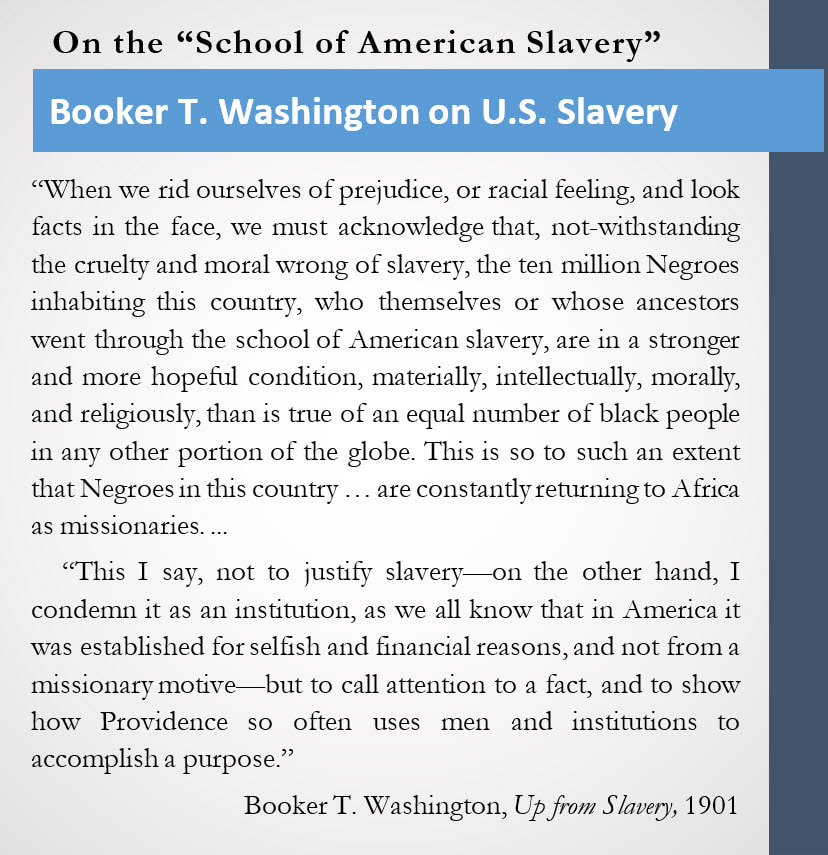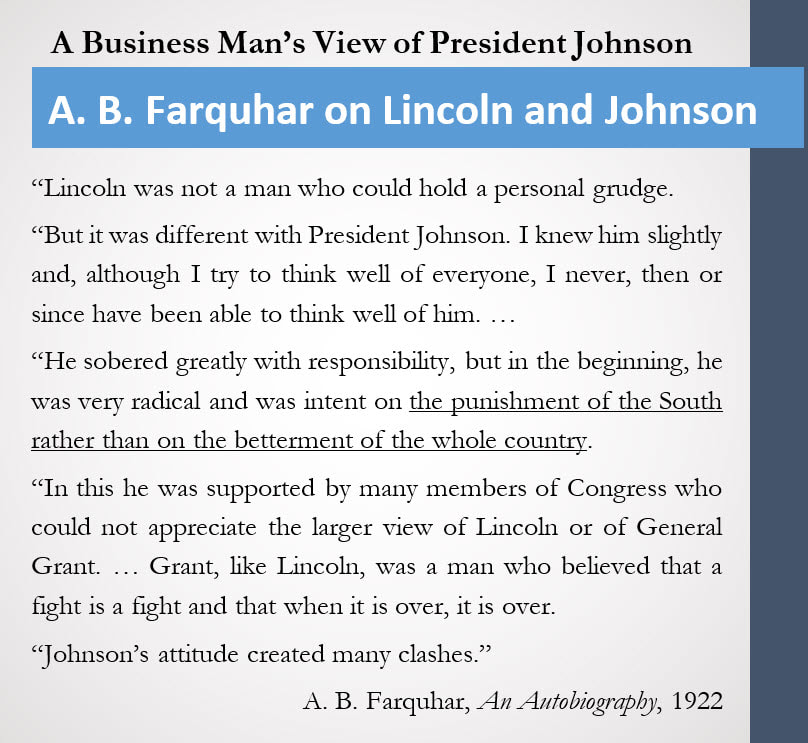A Review of "Mary Slessor of Calabar: Pioneer Missionary"
|
|
Date Published: August 13, 2023
Date Modified: February 3, 2024 |
I read this book after reading in the press the contrasting, controversial positions on slavery in the United States of our Vice-President, Kamala Harris and Florida’s Governor, Ron DeSantis. The disagreement seems to revolve around if American blacks—males and females of today, are better off, even after suffering the terrible indignations of slavery before the Civil War. I do not like having politicians, with their political agendas, controlling my thoughts so I decided to read a book about the conditions in the major slave-trading ports of Africa in the immediate, post-Civil War timeframes: 1876–1915.
A Review of “Mary Slessor of Calabar: Pioneer Missionary” by W. P. Livingston
- Reviews of the Day: 1916–17, 1936
- Selected, Composite Insights from “Mary Slessor of Calabar”
- This Author’s Thoughts and Perceptions
Reviews of the Day: 1916–17, 1936
There were no reviews for the 1941 version of the book I read, but here are a few reviews of the work from 1916–17 and 1936. The few reviews were very minimalistic:
|
“Such is the name of a book which ‘reads like a fairytale’ but is the authentic biography of as unselfish and able a pioneer missionary as ever lived on the planet. … If life is hard, if things go wrong, take up this book … yield to its fervor, think of its courage, laugh or weep over its revelations of dark places. …
“It is the story of a religious devotion. … Mary Slessor died, worn out at 67, among her black African adopted children. … The people, who when she went there, killed twin babies, offered human sacrifices, had witch doctors, and used ‘poison beans’ for trials. … “Books of this soul-stirring nature are few and far between.” Charles H. Shinn, “Weekly Comments,” The Fresno Morning Republican, 1916
|
“An interesting and unusual story of a humble born Scotch girl, … with an early zeal for missionary work and the spirit of the pioneer. … She was sent to Calabar, West Africa, in 1876, where she lived and worked until her death in 1915.
“The book, written chiefly from her letters, gives a vivid idea of the people and customs of the African bush.”
“The book, written chiefly from her letters, gives a vivid idea of the people and customs of the African bush.”
Library Notes, “Mary Slessor of Calabar,” The Charlotte News, 1917
“No one who has not lived with such people … can understand the misery in which they live. The medicine man is the master, and can demand or take what he wants, and the fear of him is in flesh and blood, for it is taught them from childhood that he can make them sick or kill. Women, of course, are only women … good for slaves. …
“It is not possible to mention some of the conditions here, but if anyone wishes to inform himself about such conditions, let him read, ‘Mary Slessor of Calabar.’ ”
“It is not possible to mention some of the conditions here, but if anyone wishes to inform himself about such conditions, let him read, ‘Mary Slessor of Calabar.’ ”
A. Stecker, “A Missionary Writes,” The Tacoma News Tribune, 1936
Selected, Composite Insights from “Mary Slessor of Calabar”
– Mary Slessor’s Experiences in Calabar, Nigeria
While reading these experiences of Mary Slessor consider what the author wrote: “Some of her experiences she could not tell; they revealed such depths of depravity and horror that the actions of the wild beasts of the bush were tame in comparison.”
The horror goes beyond what follows … absolutely unbelievable.
The horror goes beyond what follows … absolutely unbelievable.
– The Historical Setting and Description of Calabar
|
“Calabar exhibited the worst side of nature and of man. While much of it was beautiful, it was one of the most unhealthy spots in the world—sickness, disease, and swift death attacking the Europeans who ventured there. The natives were considered to be the most degraded of any in Africa. They were, in reality, the slum dwellers of negro-land. From time immemorial their race had occupied the equatorial region of the continent, a people without a history, with only a past of confused movement, oppression, and terror. …
“On the land side they were shut in without hope of expansion. When they endeavored to move up to the drier Sahara and Soudanese regions they were met and pressed back by the outposts of the higher civilizations of Egypt and Arabia, who preyed upon them, crushed them, enslaved them in vast numbers. And just as the colored folk of American cities are kept in the low-lying and least desirable localities, and as the humbler classes in European towns find a home in east-end tenements, so all that was weakest and poorest in the negro race gravitated to the jungle areas and the poisonous swamps of the coast, where, hemmed in by the pathless sea, they existed in unbroken isolation for ages. |
“Mary Slessor of Calabar:
Pioneer Missionary” |
“It was not until the fifteenth century that the explorations of the Portuguese opened up the coast. Then, to the horrors of the internal slave-trade was added the horror of the traffic for the markets of the West Indies and America. Calabar provided the slavers with their richest freight, the lands behind were decimated and desolated, and scenes of tragedy and suffering unspeakable were enacted on land and sea.
"Yet for 400 years Europeans never penetrated more than a few miles inland.”
"Yet for 400 years Europeans never penetrated more than a few miles inland.”
– The Culture of Calabar: The House
|
“The basis of the community was the House, at the head of which was a Master or Chief, independent and autocratic within his own limited domain, which consisted merely of a cluster of mud-huts in the bush. In this compound or yard, or “town” as it was sometimes called, lived connected families. Each chief had numerous wives and slaves, over whom he exercised absolute control. The slaves enjoyed considerable freedom, many occupying good positions and paying tribute, but they could be sold or killed at the will of their master. …
“This was a formless land, mysterious, terrible, ruled by witchcraft and the terrorism of secret societies: where the skull was worshipped and blood-sacrifices were offered to jujus; where guilt was decided by ordeal of poison and boiling oil; where scores of people were murdered when a chief died, and his wives decked themselves in finery and were strangled to keep him company in the spirit-land; where men and women were bound and left to perish by the water-side to placate the god of shrimps; where the alligators were satiated with feeding on human flesh; where twins were put to death, and the mother banished to the bush; where semi-nakedness was compulsory, and girls were sent to farms to be fattened for marriage. … |
“To weaken the House of a neighbor was as clear a duty as to strengthen one’s own. Oppression and outrage were of common occurrence. So suspicious were they even of each other that the chiefs and their retainers lived in isolated clearings with armed scouts constantly on the watch on all the pathways, and they ate and worked with their weapons ready to their hands. … To survive in the struggle of life a man required to possess wives and children and slaves—in the abundance of these lay his power. But if, through incompetence or sickness or misfortune, he failed - he was regarded as the lawful prey of the chief nearest him.”
– Superstition, Twin Births and Lack of Respect for Life
“A woman who gave birth to twins was regarded with horror.
|
"The belief was that the father of one of the infants was an evil spirit, and that the mother had been guilty of a great sin; one at least of the children was believed to be a monster, and as they were never seen by outsiders or allowed to live, no one could disprove the fact.
"They were seized, their backs were broken, and they were crushed into a calabash or water-pot and taken out and thrown into the bush, where they were left to be eaten by insects and wild beasts. Sometimes they would be placed alive into the pots. As for the mother, she was driven outside the bounds of decent society and compelled to live alone in the bush. “Natives threw away infants whose slave-mother died. No slave had time to bring up another woman’s child. If she did undertake the task, it would only be hers during childhood; after that it became the property of the master. … As life was of little value, it was considered best that the infant should be put out of the way.” |
“If I told you what I have seen and known of human sorrow during the past months you would weep till your heart ached.”
Mary Slessor
|
– The Witchcraft Justice System: Determining Innocence or Guilt
“They had their own idea of justice and judicial methods, and trials by ordeal formed the test of innocence or guilt, the two commonest being by burning oil and poison. In the former case a pot was filled with palm oil which was brought to the boil. The stuff was poured over the hands of the prisoner, and if the skin blistered, he was judged to be guilty and punished. In the other case the esere [Calabar] bean—the product of a vine—was pounded and mixed with water and drunk; if the body ejected the poison, it was a sign of innocence. This method was the surest and least troublesome—for the investigation, sentence, and punishment were carried out simultaneously—unless the witch-doctor had been influenced, which sometimes happened, for there were various means of manipulating the test. …
“These tests were applied when it was desired to discover a thief, or when a village wanted to know whose spirit dwelt in the leopard that slew a goat, or when a chief wished to prove that his wife was faithful to him in her heart, but chiefly in cases of sickness or death. They believed that sickness was unnatural, and that death never occurred except from extreme old age. When a freeman became ill or died, sorcery would be alleged. The witch doctor would be called in, and he would name one individual after another, and all, bond and free, were chained and tried, and there would be much grim merriment as the victims writhed in agony and their heads were chopped off. The skulls would be kept in the family as trophies. …
“The fact that a man’s position in the spirit-world was determined by his rank and wealth in this one, demanded the sacrifice of much life when chiefs died. A few months before Miss Slessor went up amongst them, a chief of moderate means died and with him were buried eight slave men, eight slave women, ten girls, ten boys, and four free wives. These were in addition to the men and women who died as a result of taking the poison ordeal.
“Even when death was due to natural decay the attendants provided were the same. … Recently a chief had died, and sixty slave people had been killed and eaten. One day twenty-five were set in a row with their hands tied behind them, and a man came and with a knife chopped off their heads.”
“These tests were applied when it was desired to discover a thief, or when a village wanted to know whose spirit dwelt in the leopard that slew a goat, or when a chief wished to prove that his wife was faithful to him in her heart, but chiefly in cases of sickness or death. They believed that sickness was unnatural, and that death never occurred except from extreme old age. When a freeman became ill or died, sorcery would be alleged. The witch doctor would be called in, and he would name one individual after another, and all, bond and free, were chained and tried, and there would be much grim merriment as the victims writhed in agony and their heads were chopped off. The skulls would be kept in the family as trophies. …
“The fact that a man’s position in the spirit-world was determined by his rank and wealth in this one, demanded the sacrifice of much life when chiefs died. A few months before Miss Slessor went up amongst them, a chief of moderate means died and with him were buried eight slave men, eight slave women, ten girls, ten boys, and four free wives. These were in addition to the men and women who died as a result of taking the poison ordeal.
“Even when death was due to natural decay the attendants provided were the same. … Recently a chief had died, and sixty slave people had been killed and eaten. One day twenty-five were set in a row with their hands tied behind them, and a man came and with a knife chopped off their heads.”
Enough examples? This book is full of them, and it should be on any reading list for those who want to understand the cultural environment left behind in Africa for a different kind of cultural slavery in the New World.
This Author’s Thoughts and Perceptions
I read this book after reading in the press the contrasting, controversial positions on slavery in the United States of our Vice-President of the United States, Kamala Harris and Florida’s Governor, Ron DeSantis. The disagreement seems to revolve around if American blacks—males and females of today, are better off, even after suffering the terrible indignations of slavery before the Civil War. I do not like having politicians, with their political agendas, controlling my thoughts so I decided to read a book about the conditions in the major slave-trading ports of Africa in the immediate, post-Civil War timeframes: 1876–1915.
|
So the reader understands, to this point in my life I have read and studied several works by Booker T. Washington [follow these separate links for book reviews: Up from Slavery, Character Building, and My Larger Education]. My initial tendency in this matter, contrary to the political stands of both Harris and DeSantis, was to agree with what Mr. Washington wrote in Up from Slavery as shown in the sidebar.
I know that in my own life, I have been down many a broken road, but as I have tried to maintain my trust in “Providence,” I have arrived at a point in my life of 70+ years that all roads have filled me with a better understanding of mankind than if I hadn’t been down a few of those very-disturbing, personal paths. Some of the most beautiful people in my life are the results of one of these broken paths. Through this book, I also found answers to questions I had held most of my life when it came to slavery in the United States of America. One I formulated when I was in grade school and never had satisfactorily answered was: |
Booker T. Washington’s perspective on slavery and “Providence’s” usage of it to eventually make life better. … over time and with hard work.
|
- Why didn’t the slaves rise in revolution against their plantation masters—who they so completely outnumbered and could have dominated by simple physical force?
The probable answer after reading this book is that the slavery conditions in the United States—although still abhorrent, were a less abhorrent continuation of a tradition—a slavery lifestyle, that was culturally rooted in those brought from Africa to America; and as bad as conditions were here, the conditions on the continent of Africa—as documented in this book, where these individuals were forcibly uprooted from—reach beyond our comprehension and social mores of today.
As seen in the excerpts above, the conditions that the American-bound slaves left behind were horrendous—especially for women and children. This is what Mary Slessor found, abhorred, fought, and tried to bring to an end during her forty years in Africa—conditions reflective of a life as it was for the four decades following the ending of slavery in the United States. Of course, the Emancipation Proclamation didn’t end slavery in Africa, only the United States of America; but it seems this is forgotten in most discussions.
|
And, unfortunately, with the assassination of President Lincoln, the best man for the job of bringing the Union back together, healing its wounds, and providing a path forward—instead of backward, was lost. After his assassination, the job of bringing the black race up to full equality fell on an incompetent vice-president. This is highlighted in a passage from A. B. Farquar’s book contained in the sidebar.
We should remember when we cast our votes in 2024 that the choice of a solid, strong, competent, balanced, and well-spoken running mate may be as important as who we put in the corner office. This work was a horrible reminder but a critically enlightening read. I would highly recommend it to both our Vice-President Kamala Harris and Governor Ron DeSantis before they again comment on American slavery outside the context of what the slaves in America left behind. They and their aids should study the works of Booker T. Washington. They are what I read when I get so frustrated with race relations. His words, ideas, and beliefs cross the color and non-color racial boundaries. Maybe then, our leaders will educate our citizens, rather than using unverified, emotional remarks to distort history for political gain. |
A. B. Farquhar knew many U.S. Presidents “more or less well.” President Cleveland was “a warm friend.” President Roosevelt was “always a personal friend.” He was within “a few feet of Lincoln’s inauguration platform.” He thought that the genius and firmness of Lincoln could find a way forward without war.
|
This was an amazing read that made me better qualified to discuss the history of slavery within and without our own United States of America. I would agree with one of the reviewers above that the Vice-President of the United States and the Governor of Florida should “inform themselves about such conditions and read, ‘Mary Slessor of Calabar.’ ”
Of course, the problem seems to be that today we have replaced the early-African witch doctors’ ordeals of burning oil and poison beans with social media’s ordeal of memes on Twitter, TikTok, Instagram, Facebook et al.
Cheers,
- Peter E.
Of course, the problem seems to be that today we have replaced the early-African witch doctors’ ordeals of burning oil and poison beans with social media’s ordeal of memes on Twitter, TikTok, Instagram, Facebook et al.
Cheers,
- Peter E.
